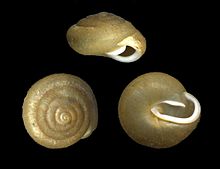Classification
Kingdom: Animalia
Phylum: Mollusca
Class: Gastropoda
Order: Stylommatophora
Family: Polygyridae
Genus: Euchemotrema
Species: Euchemotrema wichitorum
Animalia: All animals are members of the
Kingdom Animalia (Animal Diversity Web,
2012). Animals lack a cell wall and all are multicellular.
Though no all species of animals have been discovered, it is
estimated there there are roughly 9 to 10 million species that
inhabit earth (Animal Diversity Web,
2012).
Mollusca: Animals in the Phylum Mollusca live
in freshwater, marine and moist terrestrial habitats. They have
a dorsal body wall that forms a pair of folds, called a mantle,
and its ventral body wall is specialized as a muscular foot,
chiefly used for locomotion (Hickman et
al, 2009). The mantle is modified into either gills or
air-breathing lungs.
Gastropoda: Gastropoda is the largest and most
diverse class in the phylum Mollusca. Currently there are about
70,000 living species (Hickman et al,
2009). Its members includes snails, slugs, sea slugs,
limpets, and others. Their shell, if present, is either uncoiled
or coiled, through a process called torsion.
Stylommatophora: The order
Stylommatophora is composed of pulmonate snails and
slugs, all of which are terrestrial (Illinois
Natural History Survey, 2001)
Polygyridae: This family is endemic to North
America, its distinctive is the reflected lip about the aperture
in adults (Martin, 2000)
Euchemotrema: This genus of terrestrial
air-breathing snails generally have a shell possessing about 5
whorls and a light tan to dark brown color (Branson,
1972).
Euchemotrema wichitorum: This species
of land snail gets its name from the Wichita Mountains where it
is primarily found.
Habitat
Home